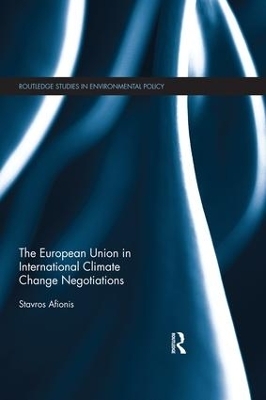
The European Union in International Climate Change Negotiations
Routledge (Verlag)
978-0-367-03015-5 (ISBN)
The EU has been portrayed as a leader in international climate change negotiations. Its role in the development of the climate change regime, as well as the adoption of novel policy instruments such as the EU Emissions Trading Scheme in 2005, are frequently put forward as indicative of a determination to push the international climate agenda forward. However, there are numerous instances where the EU has failed to achieve its climate change objectives (e.g. the 2009 Copenhagen Conference of the Parties). It is therefore important to examine the reasons behind these failures.
This book explores in detail the involvement of the EU in international climate talks from the late 1980s to the present, focusing in particular on the negotiations leading up to Copenhagen. This conference witnessed the demise of the top-down approach in climate change policy and dealt a serious blow to the EU’s leadership ambitions. This book explores the extent to which negotiation theory could help with better comprehending the obstacles that prevented the EU from getting more out of the climate negotiation process. It is argued that looking at the role played by problematic strategic planning could prove highly instructive in light of the Paris Agreement.
This broad historical perspective of the EU’s negotiations in international climate policy is an important resource to scholars of environmental and European politics, policy, law and governance.
Stavros Afionis is a Teaching Fellow in Environmental Politics at the School of Politics, Philosophy, International Relations & Environment (SPIRE), Keele University, UK. Previously, he was a Postdoctoral Research Fellow at the Sustainability Research Institute (SRI) of the School of Earth & Environment, University of Leeds, UK. His doctoral research examined the role played by the European Union in international climate change negotiations. His research interests focus on environmental politics and, in particular, international climate change negotiations and global biofuel policies. He is an associate editor for Environmental Policy and Governance and a member of the UK ESRC Centre for Climate Change Economics and Policy (CCCEP).
Introduction
Climate change: From science to policy
The development of Europe’s climate policy (1986-1992)
Momentum Gathers: From Rio to Geneva
The AGBM Process – Phase 2
From Collapse to Revival
Waiting for Russia
The Protocol Enters into Force
Heading towards success
The demise of the top-down approach
The EU as a negotiator in the climate regime
Conclusion
| Erscheinungsdatum | 29.11.2018 |
|---|---|
| Reihe/Serie | Routledge Studies in Environmental Policy |
| Zusatzinfo | 10 Tables, black and white; 10 Illustrations, black and white |
| Verlagsort | London |
| Sprache | englisch |
| Maße | 156 x 234 mm |
| Gewicht | 160 g |
| Themenwelt | Naturwissenschaften ► Biologie ► Ökologie / Naturschutz |
| Recht / Steuern ► Allgemeines / Lexika | |
| Recht / Steuern ► EU / Internationales Recht | |
| Recht / Steuern ► Öffentliches Recht ► Umweltrecht | |
| Sozialwissenschaften ► Politik / Verwaltung | |
| Sozialwissenschaften ► Soziologie ► Spezielle Soziologien | |
| Technik ► Umwelttechnik / Biotechnologie | |
| ISBN-10 | 0-367-03015-2 / 0367030152 |
| ISBN-13 | 978-0-367-03015-5 / 9780367030155 |
| Zustand | Neuware |
| Haben Sie eine Frage zum Produkt? |
aus dem Bereich


